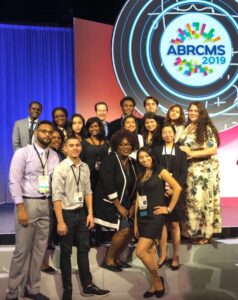The Maximizing Access to Research Careers (MARC) training program at the City College of New York has prepared undergraduate students to pursue and complete higher degree programs in biomedical science for over four decades.
MARC aims to increase diversity in the scientific community by providing financial, professional, and academic support to students from communities underrepresented in biomedical science.
Dr. Jonathan Levitt, professor and chair of the Department of Biology, has been affiliated with MARC for over 15 years, advising the training program’s diverse group of students and working with faculty mentors to prepare trainees for success in the most competitive Ph.D. programs nationwide.
“We’ve been good in that every one of our trainees has graduated; every one of our trainees who has applied to graduate school has gotten in; every one of our trainees who has gotten into graduate school has finished or is still going,” Dr. Levitt said. “Nobody has been unable to get in, or gotten there and been unprepared.”
Almost 60% of the program’s alumni have enrolled in or completed a Ph.D. program, and this number climbs to 75% when recent graduates and current trainees who have not yet started a Ph.D. program but intend to are taken into consideration, according to Dr. Levitt.
 Funded by the National Institutes of Health, MARC offers undergraduates professional development workshops, mentorship from CCNY science faculty, and a stipend plus tuition assistance to allow them ample time in the lab to pursue their own independent research projects.
Funded by the National Institutes of Health, MARC offers undergraduates professional development workshops, mentorship from CCNY science faculty, and a stipend plus tuition assistance to allow them ample time in the lab to pursue their own independent research projects.
The program is open to undergraduates in their junior year, and admitted students receive support from the program for two years. MARC is an Honors program on CCNY’s campus, and all trainees are required to maintain a high GPA and academic standing while they are enrolled in the program.
Research is at the core of MARC, as all trainees are expected to complete their own research project and pursue additional research activity at another institution during the summer, in hopes of further preparing them for future research-focused degree programs and careers.
Trainees also get the opportunity to present their findings to experts in the biomedical fields they hope to enter at local and national conferences.
Dr. Levitt notes intensive research in the lab is vital to immersing trainees in the scientific community and reducing any sense of impostor syndrome that may discourage them from pursuing a higher degree — an important step in MARC’s effort to diversify the field of science.
“We want to raise the profile of research careers, science careers, so that the college community as a whole, City College students, CUNY students, it’s on their radar that they can do this and that more of our students will enter the U.S. scientific workforce, so the workforce reflects who we all are, which, to be honest, it does not right now.”
Even though the pandemic brought the usual, hands-on work in the lab to a halt, MARC faculty mentors found new ways to keep trainees engaged, utilizing computational work and data analysis to ensure students were still pursuing their research interests.
MARC is also still providing trainees with mentoring and professional development on topics such as responsible research practices and presentation and interviewing skills.
The program has also collaborated with several other groups at CCNY — the Research Training Initiative for Student Enhancement (RISE) program and the CCNY – Memorial Sloan Kettering Partnership for Cancer Research program — to raise awareness among CCNY undergraduates for potential careers in science by organizing professional development seminars and bringing in guest speakers.
“Most people who come into science as undergrads don’t necessarily know what they want to do, or don’t even really know what one can do with a science degree beyond ‘go be a doctor’ or ‘go be a dentist,’” Dr. Levitt said.
“Part of the difficulty is educating students, not getting people to do something they don’t want to do, but to educate them about what training and career possibilities there are and help and figure out which students this path might be appropriate for.”
MARC’s success is indicated not only by how its alumni have fared in their post-undergraduate studies, but also by the awards and recognition its trainees have received over the years.
Alumni of the program have co-authored published papers and won awards at research conferences such as the Annual Biomedical Research Conference for Minority Students and National Conference on Undergraduate Research, and from professional societies like the American Chemical Society, Biophysical Society, and Society for Neuroscience, according to Dr. Levitt.
MARC hopes to continue this level of success and support more CCNY students through the program and into the biomedical career paths they wish to pursue.

Gabriel is a student at the Weissman School of Arts and Sciences at Baruch College, double majoring in journalism and political science. He is also the editor of the Science & Technology section of Baruch College’s independent, student-run newspaper, The Ticker.